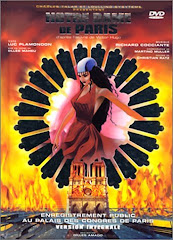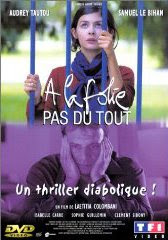
Last night, as class began a very special event was already happening- the August 28th 2007 total lunar eclipse, the full moon was in the shadow of the earth, glowing darkly red. We all took a walk up to the roof of the ILI to have a better look and were able to see the moon completely in shadow, hovering over Taipei 101. A beautiful sight.

Multiple exposure composite photo of the lunar eclipse of October 2004 as seen from Northern California.
Though lunar eclipses are not so rare, happening twice a year, it is rare that people actually see them. For many, there is just no information available- they only hear about it after the fact, reported in the next-day’s newspaper. For me, throughout my life, eclipses were always something to make sure not to miss. I always tried to plan to be in a place where I could observe it, if possible. One of the most impressive lunar eclipses I remember was in 1989 when I was able to watch the entire eclipse on the Oregon coast.

As city dwellers, we have lost touch with some of our ancient roots. Civilizations for thousands of years have looked up at the night sky for inspiration, and in wonder. They watched planets and constellations and created myths and stories; but today, we have mostly forgotten these and have forgotten our connection. Few in class last night knew that there would be an eclipse, fewer yet had ever even seen one. For me, it’s sad that we can’t even see the night sky when we look up because of all the glare from out vibrant, never-sleeping, always-illuminated city.

The Greeks observed the heavens and named constellations and planets after their Gods and creating myths related to these Gods. What we know today as Astrology originates from these myths and the traits of these Gods. Last night we discussed the problems with Astrology and how it is based on the rotation of the planets and solar system 2000 years ago. If adjusted for today’s cycle, many of us would have different star signs! In fact, there should be 13 star signs, not 12!

Multiple exposure composite photo of the lunar eclipse of October 2004 as seen from Northern California.
Though lunar eclipses are not so rare, happening twice a year, it is rare that people actually see them. For many, there is just no information available- they only hear about it after the fact, reported in the next-day’s newspaper. For me, throughout my life, eclipses were always something to make sure not to miss. I always tried to plan to be in a place where I could observe it, if possible. One of the most impressive lunar eclipses I remember was in 1989 when I was able to watch the entire eclipse on the Oregon coast.

As city dwellers, we have lost touch with some of our ancient roots. Civilizations for thousands of years have looked up at the night sky for inspiration, and in wonder. They watched planets and constellations and created myths and stories; but today, we have mostly forgotten these and have forgotten our connection. Few in class last night knew that there would be an eclipse, fewer yet had ever even seen one. For me, it’s sad that we can’t even see the night sky when we look up because of all the glare from out vibrant, never-sleeping, always-illuminated city.

The Greeks observed the heavens and named constellations and planets after their Gods and creating myths related to these Gods. What we know today as Astrology originates from these myths and the traits of these Gods. Last night we discussed the problems with Astrology and how it is based on the rotation of the planets and solar system 2000 years ago. If adjusted for today’s cycle, many of us would have different star signs! In fact, there should be 13 star signs, not 12!









No comments:
Post a Comment